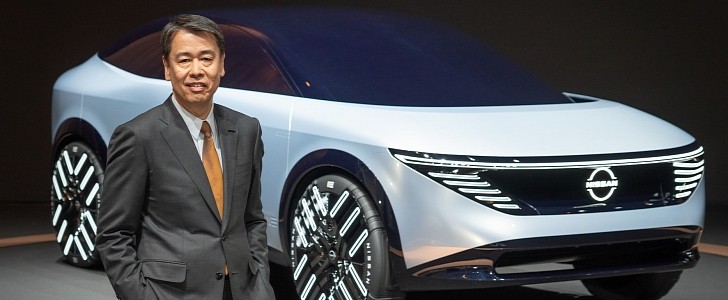Makoto Uchida does not know if the Nissan Ambition 2030 plan is overinvesting or underinvesting in electrification. Despite that, the Nissan CEO told Automotive News he is confident the company will start selling cars in 2028 with solid-state batteries. The price of these cells will be $75/kWh, and it will eventually fall to $65/kWh.
According to Uchida, the fact that the company presented the cost number means that it has “a logic behind it.” We mentioned it was very specific when Nissan released its strategic plan on November 29. Until that point, nobody had disclosed the cost of solid-state batteries, and no company has done the same until now.
What the Nissan CEO failed to explain was why Nissan believes its solid-state batteries will only be available in 2028. Toyota already said it plans to sell cars with the new cells by 2025 or earlier – the same schedule QuantuScape has for its solid-state battery platform to reach Volkswagen electric vehicles. If these companies meet these targets, Nissan will only join them after three years, which may be a big problem for the Japanese carmaker.
Uchida-san does not seem to be concerned with that. To be fair, Automotive News did not ask him about this apparent delay, but it did ask him about Nissan’s pillars for electrification. The Japanese automaker CEO said that Nissan would count not only on solid-state batteries but also on e-POWER.
If you are not familiar with this tech, it uses standard fuels as an electricity source. Small combustion engines burn them to generate electricity. This energy is stored in a small battery pack that powers the electric motors that move Nissan products with this badge. In Brazil, there’s great expectation for the Kicks e-POWER, which will also burn ethanol, a renewable fuel.
Uchida said that these different pillars would help Nissan evolve and cut carbon emissions in different ways depending on the market. Emerging countries may take more time to ditch combustion engines because EVs are still too expensive.
Unfortunately, that may mean that they will stop producing vehicles because all major car companies are developing electric cars. Either they will make old engines – increasing emissions – or just give up on them. Nissan’s e-POWER may mean that emissions will be much lower until battery prices allow affordable electric cars.
According to Uchida, the fact that the company presented the cost number means that it has “a logic behind it.” We mentioned it was very specific when Nissan released its strategic plan on November 29. Until that point, nobody had disclosed the cost of solid-state batteries, and no company has done the same until now.
What the Nissan CEO failed to explain was why Nissan believes its solid-state batteries will only be available in 2028. Toyota already said it plans to sell cars with the new cells by 2025 or earlier – the same schedule QuantuScape has for its solid-state battery platform to reach Volkswagen electric vehicles. If these companies meet these targets, Nissan will only join them after three years, which may be a big problem for the Japanese carmaker.
Uchida-san does not seem to be concerned with that. To be fair, Automotive News did not ask him about this apparent delay, but it did ask him about Nissan’s pillars for electrification. The Japanese automaker CEO said that Nissan would count not only on solid-state batteries but also on e-POWER.
If you are not familiar with this tech, it uses standard fuels as an electricity source. Small combustion engines burn them to generate electricity. This energy is stored in a small battery pack that powers the electric motors that move Nissan products with this badge. In Brazil, there’s great expectation for the Kicks e-POWER, which will also burn ethanol, a renewable fuel.
Uchida said that these different pillars would help Nissan evolve and cut carbon emissions in different ways depending on the market. Emerging countries may take more time to ditch combustion engines because EVs are still too expensive.
Unfortunately, that may mean that they will stop producing vehicles because all major car companies are developing electric cars. Either they will make old engines – increasing emissions – or just give up on them. Nissan’s e-POWER may mean that emissions will be much lower until battery prices allow affordable electric cars.



















































